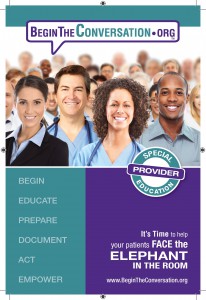Provider Resources
In healthcare, we see thousands of patients throughout our careers for many reasons at birth, a broken bone, rehabilitation, home health, surgery, chronic diseases and more. However, there is one thing about our patients we all must come to terms with one day they will all face end of life. It could be around the corner or many years away, but we know some day all of our patients will die. That’s why we believe providers need more resources to help them Begin the Conversation about end of life with their patients.
So, why is it so hard to Begin the Conversation with our patients about end of life?
There are many reasons:
- We don’t have enough time during a patient encounter to discuss it properly.
- We feel uncomfortable talking about death and dying.
- When we mention advance directives, some patients think we have lost hope for their care and recovery.
- We second-guess ourselves. Is it really time? We think it may not be our place to discuss end of life and that it should be done by families.
- We receive inadequate reimbursement to Begin the Conversation.
- We have a fear of making a patient and/or family upset and/or uncomfortable.
We cant change the fact one day our patients will die, but we CAN begin to discuss end-of-life wishes that could impact how and where they die.
Why is it important to have these conversations with our patients?
- In their last two years of life, patients with chronic illnesses account for about a third of total Medicare spending. (Dartmouth Study)
- A Dartmouth Atlas study found that 17 percent of Medicares $550 billion annual budget is spent on patients last six months of life.
- In 2012, Medicare paid $55 billion for doctor and hospital bills during the last two months of patients lives. (CBS News)
- A 2007 National Institutes of Health study found that 78 percent of cancer treatment spending
occurs in the final month alone, when treatments can often be futile. - Healthcare providers often know that many end-of-life treatments patients and families believe will extend life usually do not.
Did you know?
- Aggressive end-of-life treatments have been associated with decreased quality of life for patients and worse bereavement adjustment. (NEJM, Early Palliative Care for Patients with Metastatic Non-Small-Cell Lung Cancer)
- A person without advance care planning is physically moved from one setting to another an average of three times in the last few weeks of life. (Journal of the American Medical Association study, 2013)
- Cancer patients saw 10 or more physicians during the last six months of life and experienced increased strain on patients and caregivers as well as increased healthcare costs. (Dartmouth study)
In the whirl of doctors appointments, transferring from one location to another and fragmented care, it is easy for patients, caregivers and providers to avoid difficult conversations about end-of-life care.
 That’s why Begin the Conversation has created specific tools designed to help healthcare providers have these important conversations with their patients and their families. We provide education, training and resources that draw upon research, studies and our own experience in talking about advance care planning, ACP documentation and planning for end of life.
That’s why Begin the Conversation has created specific tools designed to help healthcare providers have these important conversations with their patients and their families. We provide education, training and resources that draw upon research, studies and our own experience in talking about advance care planning, ACP documentation and planning for end of life.
Our Begin the Conversation Provider Toolkit walks healthcare providers through important, needed documents, and shares “Spikes: six-step protocol for delivering bad news: Application to the patient with cancer” shared with permission from The Oncologist.
We also have a Provider Resource Pocket Guide. It’s a shortened version of the more extensive toolkit, which we have designed to easily fit in a lab coat pocket, that way you can take it with you wherever you go.
For more information about our provider education resources and to arrange to have someone from our Begin the Conversation program come to your location and help you learn how to share the Begin the Conversation message with others, please call 1-800-733-1476 or email info@begintheconversation.org.
